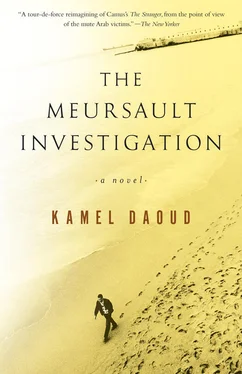Oh, what a joke! Do you understand now? Do you understand why I laughed the first time I read your hero’s book? There I was, expecting to find my brother’s last words between those covers, the description of his breathing, his features, his face, his answers to his murderer; instead I read only two lines about an Arab. The word “Arab” appears twenty-five times, but not a single name, not once. The first time Mama saw me printing the first letters of the alphabet in my new school notebook, she handed me the two newspaper articles and commanded me to read them. I couldn’t, I didn’t know how. “It’s your brother!” she shot at me in a tone of reproach, as if I’d failed to recognize a body in a morgue. I remained silent. What could I add to that? All of a sudden, I saw what she expected me to do: to make Musa live after dying in his place. A fine brief, don’t you think? With two paragraphs, I had to find a body, some alibis, and some accusations. It was a way of continuing Mama’s investigations, her search for Zujj, my twin. That led to a strange book — which I perhaps should have written out, as a matter of fact, if I’d had your hero’s gift — a counter-investigation. I crammed everything I could between the lines of those two brief newspaper items, I swelled their volume until I made them a cosmos. And so Mama got a complete imaginary reconstruction of the crime, including the color of the sky, the circumstances, the words exchanged between the victim and his murderer, the atmosphere in the courtroom, the policemen’s theories, the cunning of the pimp and the other witnesses, the lawyers’ pleas … Well, I can talk about it like that now, but at the time it was an incredibly disordered jumble, a kind of Thousand and One Nights of lies and infamy. Sometimes I felt guilty about it, but most often I was proud. I was giving my mother what she’d searched for in vain in the cemeteries and European neighborhoods of Algiers. That production — an imaginary book for an old woman who had no words — lasted a long time. It came in cycles, don’t get me wrong. We wouldn’t talk about it for months, but then, all of a sudden, she’d start fidgeting and mumbling, and she’d end up planting herself in front of me and brandishing the two crumpled scraps of newspaper. Sometimes I felt like a ridiculous medium communicating between Mama and a phantom book; she’d ask it questions, and I was supposed to translate its answers.
So that’s how my language learning was marked by death. Of course, I read other books, history, geography, but everything had to be related to our family history, to my brother’s murder on that blasted beach. That was a mug’s game that stopped only sometime in the last months before Independence; maybe my mother could sense Joseph’s presence — he was still alive then. Maybe she could make out his mad footsteps as he prowled around Hadjout, around his own future grave, in his beach sandals. I had exhausted all the resources of the language and my imagination. We had no other choice than to wait. For something to happen. To wait for the famous night when a terrorized Frenchman would wind up in our dark courtyard. Yes, I killed Joseph because I had to counterbalance the absurdity of our situation. What happened to those two newspaper clippings? God knows. Maybe they crumbled into dust, maybe they were folded and refolded so many times they dissolved. Or maybe Mama eventually threw them away. I would surely have been inspired enough to write out everything I made up back then, but I didn’t have the resources to do it, nor did I realize that the crime could become a book and the victim a simple ricochet of bright light. Is that my fault?
So you can guess the effect it had on us when a young woman with very short, dark brown hair knocked on our door one day and asked a question nobody had ever asked before: “Is this the family home of Musa Uld el-Assas?” It was a Monday in March 1963. The country was in full celebration mode, but a kind of fear underlay the rejoicing, for the beast fattened on seven years of war had become voracious and refused to go back underground. A muted power struggle was raging among the conquering commanders.
“Is this the family home of Musa Uld el-Assas?”
MERIEM
I often repeat that question to myself and try to recapture the cheerful tone she asked it in — very polite and friendly, like a luminous proof of innocence.
It was my mother who opened the door — I wasn’t far away, lounging in a corner of the courtyard, I couldn’t be bothered to get up — and I was surprised to hear the caller’s clear, womanly voice. No one had ever come to pay us a visit. Mama and I constituted a couple that discouraged all forms of sociability, and people avoided me in particular. I was a somber, taciturn bachelor, perceived as a coward. I hadn’t fought in the revolution, and that fact was remembered with rancor and tenacity. The strangest thing, however, was to hear Musa’s name spoken by a person other than my mother — I myself always said “him.” The two newspaper clippings referred to him only with his initials — or maybe not, I don’t remember. So anyway, I heard Mama answer “Who?” and then she listened to a long explanation I missed most of. “Better say that to my son,” Mama declared, and she invited the visitor inside. It was high time for me to get up and see who’d come calling. And so I saw her: a small thin woman with dark green eyes, a guileless, white-hot sun. Her beauty hurt my heart. I felt my chest imploding. Until that moment, I’d never looked at a woman as one of life’s possibilities. I had enough to do, what with extracting myself from Mama’s womb, burying the dead, and killing fugitives. You see what I mean? We lived as recluses, I’d grown used to it, and then all of a sudden this young woman shows up, poised to sweep all before her, everything, my life, the world Mama and I had. I felt ashamed, I got scared. “My name is Meriem,” she said. Mama had her sit on a stool, her skirt hiked up a little, I tried not to look at her legs. She explained to me in French that she was a teacher, and she was working on a book that told my brother’s story, and the book was written by his murderer.
We were there in the courtyard, Mama and I, speechless, trying to understand what it all meant. Musa was rising from the dead, in a way, stirring in his grave and obliging us once again to feel the heavy sorrow that was his legacy. Meriem sensed our confusion and repeated her explanations slowly, kindly, and also a bit cautiously. She addressed Mama and me in turn, murmuring as though we were convalescents. We remained silent, but eventually I came out of my trance and asked some questions that couldn’t hide how flustered I was.
In fact, I think I felt as though a sixth and final bullet had just pierced a new hole in my brother’s skin. And that’s how Musa my brother died three times in a row. The first time was at two o’clock in the afternoon on “the day of the beach”; the second time, when I had to dig him an empty grave; and the third and last time, when Meriem entered our lives.
I vaguely recall the scene: Mama suddenly on the alert, her eyes mad and staring, herself coming and going under the pretext of making more tea or looking for the sugar, the shadows spreading on the walls, Meriem’s discomfort. “I had the impression I’d showed up with my tale and my questions and interrupted a funeral,” she admitted to me later, after we started seeing each other — unbeknownst to Mama, naturally. Before she left, she took the famous little volume out of her bag, the same work you so sensibly keep in your briefcase. In her view, the thing was very simple. A celebrated author had told the story of an Arab’s death and made it into an overwhelming book — “like a sun in a box” was the way she put it, I remember that. She’d been intrigued by the mystery of the Arab’s identity, had decided to conduct her own investigation, and by sheer pugnacity had followed the trail back to us. “Months and months of knocking on doors and questioning all kinds of people, just so I could find you,” she told me with a disarming smile. And she made a date with me for the next day, at the train station.
Читать дальше












